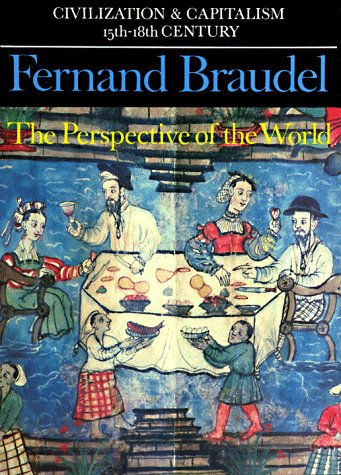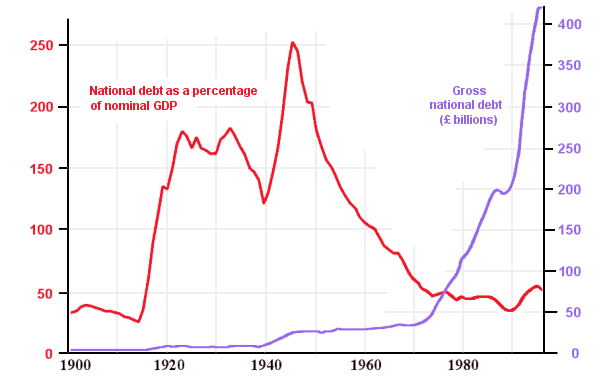Gab@StFerdinandIII - https://unstabbinated.substack.com/
Plenty of cults exist - every cult has its 'religious dogma', its idols, its 'prophets', its 'science', its 'proof' and its intolerant liturgy of demands. Cults everywhere: Corona, 'The Science' or Scientism, Islam, the State, the cult of Gender Fascism, Marxism, Darwin and Evolution, Globaloneywarming, Changing Climate, Abortion...
Tempus Fugit Memento Mori - Time Flies Remember Death


Braudel's work, 'The Perspective of the World' is the best one volume compendium outlining the rise of capitalism and the modern world, from 1500-1800. A French historian of fame and note, Braudel eschews the usual mindless neo-Marxist analysis and tries to identify how the modern world, and the system in which the state and the actors managing and creating capital, interacted to create the blessings of modernity. His study is replete with facts, examples, common-sense and real-world observations.
In other words it offends those who live in the world of Marxist-socialist distortions.
One interesting aspect of this work, is his rationale for the rise of English power in the 18th century. England defeated Holland in the race for global supremacy. As Braudel rightly points out from 1600 to about 1790 the Dutch, not the French, were the main aspirants to control the trading and capitalist order. His logical analysis of the rise of Holland is quite remarkable. So too is his investigation as to why England defeated Holland and was able to control the world's system of capital and trade.
In many ways, it can be submitted that the Dutch and English national cultures were quite similar. Independence, private property protection, tolerance, a stout legal system, checks on monarchical power, and a craving and ability to produce, make profit and trade, are found within both national units. One should not forget as well that in 1688 under William of Orange, the Dutch basically conquered England. William landed and marched to London at the head of 10.000 Dutch troops, ostensibly to save Protestant England from the Catholicity of Charles the younger. It was in reality a merging of two national cultures which were quite alike.
But I digress. England's eventual triumph over Holland was secured through 4 naval wars – the last two of which the English won, all of them taking place before 1688. Maritime trade supremacy was secured at least in part by force. But trade is not a matter of war, but an outcome of other factors including cultural, economic and political. But one reason – often overlooked – why England was able to dominate industry, output and the trading lanes of the oceans was its access to capital. Inflows of money built up funds and reserves which were then redeployed into first agricultural innovation; than the development of the wool industry; than the creation of the coal industry; and finally capital seeking higher returns, invested in the industrial age including steam engines and railways.
England attracted capital for many reasons. Political stability. A lower level of political theft and rape. The rule of law. Dynamic sectors producing high returns. Low taxation on income and profits. Honesty in paying off debts. But one crucial factor, usually ignored, is highlighted by Braudel – that of debt.
“All these things counted, but England's greatness – shortly to bring about an industrial revolution which nobody could at the time have predicted – was not the result simply of the rise and organization of the expanding British market, nor entirely of the unrestrained growth common to all developed countries of Europe in the eighteenth century. It was also the result of.....The pound sterling was a modern currency; the banking system was one which shaped and adapted itself in a modern direction; and the national debt was rooted in the security of long-term or perpetual debt...” [p. 375]
National debt allowed the English to do many things. They could wage wars – even ruinous ones such as the American Revolutionary War, and still survive [France by contrast went bankrupt]. They could build fleets on credit. They could construct a merchant navy on credit which then could sail into the Baltic and elbow aside the Dutch, to procure timber, tar and materials. They could use credit to finance the control of the lucrative Russian trade – in return for future profits – and also to impose trading terms on America, and southern European countries. The English, through the judicious use of debt, war and trading power, were the arbiters of the global system of supply, production and transport:
“It is enough to have seen how London was able to impose terms of trade on Russia, Spain, Portugal and the United States; or the way in which England, pushing aside her European rivals, effortlessly reconquered the markets of her former colonies in the New World..” [p. 376]
The access to debt built upon the riches of agricultural and industrial innovation from the 13th century onwards, was a treasure for the English. Braudel is right. Without the ability to use the streams of high profits and future sources of wealth as guarantees, the English would never have been able to borrow such vast sums of money which was used in large part to pay for her wars and her merchant marine.
“The national debt was the major reason for the British victory. It had placed huge sums of money at England's disposal at the very moment when she required them.....Pitt the Younger could declare to the Commons that on the nation debt depended “the vigour and even the independence of this nation....had it not been for its trade, its industry and its credit which only exists on paper.” [p. 378]
The 'vigour' of little England might indeed have been based on her debt, itself firmly supported by a dynamic and profitable economy and trading position, but how much was this debt ? Importantly it never surpassed 200% of GNP. This is the limit which Braudel says could not be passed, without frightening foreign debt and bond holders. The English national debt never approached this limit, usually arresting its upward course at about 140%. The English were also avid and honest payers of interest to their debt-holders. Interest payments were always on-time. A history of such attention to service payments made it much easier to secure on-going debt.
Today of course not so 'Great' Britain is bankrupt. Like all Western states it owes 800% of its GNP in total debts – both current and off the balance sheet. There is no possibility of any state, especially one as minor and as riven by statism as England, in paying off this debt. An inevitable collapse is waiting. This is something that Braudel would agree with. Modern England's impaired finances, makes the securing of future debt impossible, and only the collapse of the entire state managed edifice, will allow a restructuring of national finances and national purpose.
Consider that today total taxation in England is just under 50% of GNP – more than double that of 200 years ago: “...taxation in England amounted to 22 per cent of G.N.P., while in France it was only 10 per cent....This runs counter to the usual assertions by historians...” [p. 384]
I doubt that the French level of taxation in 1800 was so low. One of the main reasons for the French Revolution was national insolvency and crushing taxation. But okay let's assume Braudel is right which I think he is not. The English system of taxation in 1800 was quite importantly, based on consumption. The punishing tax levels we have today on capital, income, assets, and production, not to mention trade; did not exist in 1800. This is a very significant reason why the English were able to accumulate and redeploy capital into high rent-producing sectors:
“In England indirect taxation levied on the very many consumer goods (including mass consumption) made up the largest share of the tax burden (70 per cent between 1750 and 1780). And these indirect taxes were less visible, easier to conceal under prices....” [p. 384]
Taxation on consumption is always preferred to taxation on capital and income. Today the English have it backwards. They have a high value added tax but a litany of other taxes which depress savings, investments, and profits. Such a system only leads to stagnation.
Two hundred years ago per-capita English GDP was higher than the French by about 20-30% [p. 384]. Though not enormous the difference in aggregate meant that England with some 6 millions in population in 1800; was able to acquire the necessary capital needed to defeat Napoleonic France which was crawling with 3 times the population. Today the GDP levels and per-capita outputs are equal. The English advantage is long gone. These facts are clear indictments of modern British social and economic policy. Over-taxation and the expansion of quite useless and dangerous debt to buy votes has ensured the future poverty of Lesser Britain. There is little to nothing to distinguish modern English political-economy from that of modern France. It was of course not always so. In fact the modern world grew out of the singular and quite independent development of the English state which showed an unlimited number of key attributes which differentiated it from the Continent.
Not so today. England is just another European welfare state, trapped in the endless loop of high debt and high taxation – and of course declining prosperity.